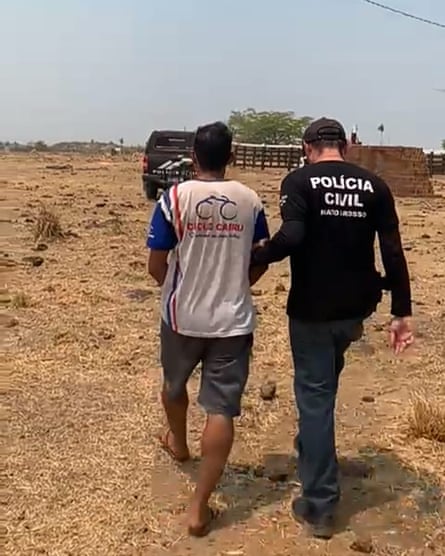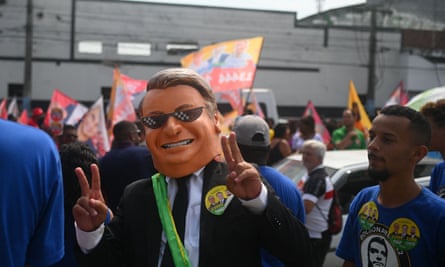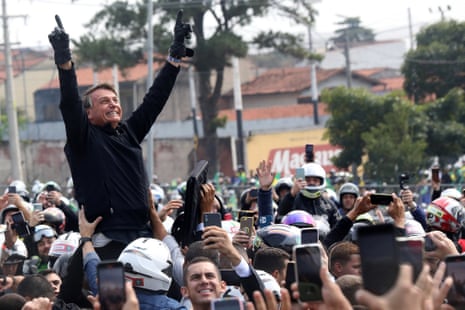The body was found in the shade of a mango tree: a man’s life cut short in a frenzy of stabbing – and a horrifying symbol of the political violence that has gripped Brazil under its rabble-rousing president, Jair Bolsonaro.
“He showed no sign of remorse,” the police chief investigating the murder said of the prime suspect, a Bolsonaro-supporting lumberjack who allegedly committed the crime because he disliked the victim’s leftist views.
The murder of Benedito Cardoso dos Santos, which took place last Wednesday near a remote Amazon town, has sent shock waves through South America’s most populous nation as it braces for its most important presidential election in decades on 2 October.
Bolsonaro, a pro-gun former paratrooper notorious for his radical rhetoric, has not commented on the killing, which police say was the result of a political altercation involving one of his devotees.
But Bolsonaro’s political opponents are convinced the toxic climate whipped up by the far-right populist lies behind the murder – and a series of other violent incidents which have taken place ahead of next month’s crunch vote.
Within hours of last week’s murder Bolsonaro – who calls the election a battle between good and evil – demanded leftists be “eradicated from public life”. During the last election – when Bolsonaro himself was stabbed by a mentally ill lone wolf – he called for supporters of Lula’s Workers’ party to be “machine-gunned”. After winning power, Bolsonaro promised a cleanup of “red outlaws”.
“The country is moving toward a savagery we have never before known,” the former leftist president Luiz Inácio Lula da Silva, who looks poised to defeat Bolsonaro in October’s election, warned last week after the murder of his supporter.

Alexandre Padilha, a key member of Lula’s campaign team and former minister, said he had no doubt Bolsonaro bore responsibility for the spate of violent incidents, which includes the fatal shooting of a member of Lula’s Workers’ party by a Bolsonarista and an attack on a Lula rally with an excrement-filled bomb.
“Bolsonaro and Bolsonarismo encourage political violence with an intensity Brazil has never seen,” claimed Padilha, a congressman for São Paulo state.
“Bolsonaro promotes hatred, he promotes the extermination of his adversaries and Bolsonaro has doled guns out all around the country,” Padilha added, noting how the number of privately owned weapons had soared to nearly 2m thanks to the president’s loosening of gun laws.
Last weekend armed Bolsonaro supporters reportedly threatened two prominent leftwing politicians, Guilherme Boulos and the presidential candidate Ciro Gomes, while they were campaigning.
“It was horrible … nobody was expecting it,” said Ediane Maria, a leftist politician who was handing out leaflets with Boulos when they were confronted by a visibly agitated man.
“He said, ‘I’m Bolsonaro!’ and, jittery, he lifted up his shirt and showed that he was carrying a gun. You could see the grip,” Maria said. “These people have always existed … but Bolsonaro has given them a voice.”
At a televised debate on Tuesday night, a pro-Bolsonaro politician was filmed harassing and insulting Vera Magalhães, a prominent female journalist whom Bolsonaro recently called “a disgrace to Brazilian journalism”.

Padilha cited the recent murders of the British journalist and Guardian contributor Dom Phillips and the Indigenous expert Bruno Pereria as further examples of the “extremely serious [wave of] political violence” affecting Brazil.
“Phillips advocated the protection of the Amazon and was denouncing illegal activities in the Amazon. Bolsonaro has turned the Amazon into a land without law,” he said.
Police are still investigating what exactly happened in the lead-up to last Wednesday’s murder, near the Amazon town of Confresa in Mato Grosso state.
Investigators believe the crime occurred after two lumberjacks – Cardoso dos Santos, 42, and Rafael Silva de Oliveira, 24 – went out for a post-dinner cigarette and ended up arguing over Brazil’s rancorous election race.
“Benedito was championing the former president Lula. Rafael was championing President Bolsonaro – and they started to row,” said the local civil police chief, Victor Oliveira Pereira.
What followed was a bloodbath, with Silva de Oliveira allegedly stabbing his victim at least 15 times in the neck and head before trying to decapitate him with an axe and filming the scene.
The suspect confessed to the crime the next day after unsuccessfully trying to flee.
“We live in a democratic state where people have the right to express their opinions. According to the constitution, political pluralism is one of the foundations of our country. If things go on like this, we will go backward as a society,” the police chief warned.
“We cannot allow this to become commonplace. We must have the right to express our opinions without it ending in violence,” he added.
Padilha said that at no point in his four decades in politics had he felt such aggression and hatred on the streets. “Brazil is living through a climate of political violence the likes of which we’ve not seen since the return of democracy … and more than merely a climate, we’re now seeing a concrete reality.”

Fears of a violent attack on Lula – which grew after the recent attempt to assassinate Argentina’s vice-president, Cristina Fernández de Kirchner – are such that the former president has taken to wearing a bulletproof vest beneath his shirt at rallies.
Padilha admitted politicians and activists were worried, but insisted they would not be frightened into withdrawing from campaign events. “We will face this political violence without hatred but without fear,” he said.
Ediane Maria also vowed to continue her political struggle despite the threats. “We will not abandon the streets. These things only make us more determined … to fight so we can defeat Bolsonaro and he is gone from government on 2 October,” she said. “They will not intimidate us. We will continue to advance.”
